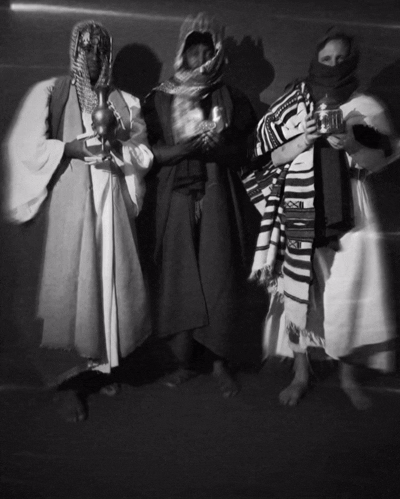Following Yonder Star…
O Star of Wonder, Star of Night,
Star with Royal Beauty bright,
Westward leading, Still proceeding,
Guide us to Thy perfect Light.
(”We Three Kings”, John Henry Hopkins Jr., 1857)
A Reflection
Your brain loves to fill in the gaps. When there's missing information—about a person, a story, or even God—it starts to write its own version. We create scenes, motives, and meanings to make sense of what we don't fully understand.
Take Christmas, for example. The story we picture in our minds is often filled with details that aren't actually in Scripture. We imagine Mary and Joseph being turned away from busy inns, Mary going into labor at the last minute, or three Wise Men kneeling by the manger on the night Jesus was born. None of those moments is recorded in the Bible. They're our imagination's way of building familiarity around something mysterious and divine—God entering the world in a way beyond our understanding.
Matthew’s Mysterious Magi
When Matthew tells the story of Jesus' birth, he has one clear goal: to show that Jesus is the long-awaited Messiah and rightful King. But how he does it is unconventional. Matthew begins with a genealogy to establish Jesus' royal bloodline. Then, he tells of an angel visiting Joseph, explaining that Mary's pregnancy is miraculous—proof that this king was divinely conceived. But then comes the strangest story of all: the Magi. Why include them? These mysterious figures from Persia are meant to show that even foreign nations recognize Jesus' kingship. It's as if Matthew is saying, "Even the outsiders see what some insiders will miss."
The Magi were not quaint travelers with camels and gold boxes—they were powerful individuals. In ancient Persia, they were royal advisors, scholars, and priests of another faith entirely. They practiced astrology and alchemy. Their influence was so significant that in the book of Daniel, it was the Magi who convinced the king to throw Daniel into the lion's den. And yet, these priests of another faith are among the first to bow before Christ.
Just Obey?
"When Jesus was born in Bethlehem of Judea during the time of King Herod, Magi from the east came to Jerusalem and asked, ‘Where is the one who has been born King of the Jews? We saw his star and have come to worship him.'" (Matthew 2:1–2)
Notice something: the text never says the Magi followed the star to Jerusalem. It says they saw it. They followed their assumptions. If a King of the Jews was born, of course, he must be in the palace! So they went where they thought the newborn Messiah would be… and found themselves in the wrong place. How often do we do the same? We assume we know how God works —and we end up standing in a palace of our own projection instead of the manger where the Savior is lying.
In church, we talk a lot about obedience. But obedience without discernment can be dangerous. Suppose people are told to "just obey" without learning how to recognize God's voice for themselves. In that case, they'll start depending on someone else's voice instead of their own relationship with the Holy Spirit. That's why Psalm 1:2 says the blessed person "meditates on His law day and night.” It's in that meditation, that slowing down and listening, that discernment grows.
Follow the Light
The Magi eventually learned that lesson. After leaving Herod, Scripture says,
"The star they had seen when it rose went ahead of them until it stopped over the place where the child was."(Matthew 2:9)
Once they stopped following their own logic, they found the light, and it led them to Christ. Assumptions fill the gaps—but truth fills the soul. When you find yourself lost in the gaps of what you don't know, pause. Look again for the light that first caught your attention. It's still there, quietly waiting to guide you—not to the palace, but to the Presence.
Take with You
There’s a phenomenon in astronomy called scintillation. It’s what makes stars appear to twinkle—but stars don’t actually flicker. Their light is constant. What we see as twinkling is just the light being distorted as it passes through the pollution of Earth’s atmosphere.
In the same way, Jesus came as the true light—faithfully reflecting the glory of His Father. Yet the “pollution” of people’s expectations distorted how many saw Him. We see that in the story of the Magi when they appear at Herod’s palace gates asking about a newborn king. But when the Magi followed the star, they found him. The star didn’t shine with its own light—it simply reflected the light of the sun.
That’s our calling, too. To be like stars—faithfully reflecting the light of the Son so others can find Him. There are millions of lights in the night sky, but not all of them shine bright enough to follow. So ask yourself: Is the light I’m reflecting helping people find Jesus—or just making them look in the wrong direction?
Photography: Brooke Balentine (@brooke.balentine)
Models: Christian (@christianbalentine), Julius (@jxsgod), and Tyvaun
Design and Art Direction: Julius Shumpert (@saintjuliusart)





